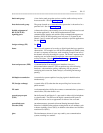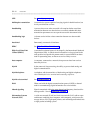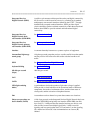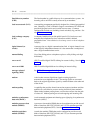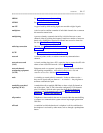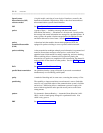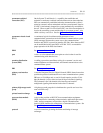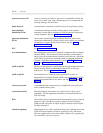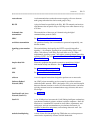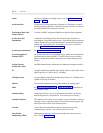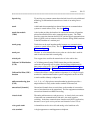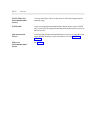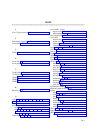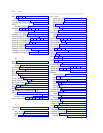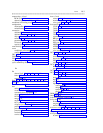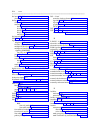GLOSSARY GL-21
_ ______________________________________________________________________________________
_ ______________________________________________________________________________________
_ ______________________________________________________________________________________
route advance A telecommunications routine that routes outgoing calls over alternate
trunk groups when the first-choice trunk group is busy.
RS-232 A physical interface specified by the EIA. RS-232 transmits and receives
asynchronous data at speeds of up to 19.2 kbps over cable distances of up
to 50 feet.
S-channel data
transmission
The transmission of data over an S-channel using the digital
communications protocol (DCP).
SDLC See Synchronous Data Link Control.
serial data transmission An operation whereby data is transmitted or processed sequentially, one
bit after another.
signaling system number
7
The standard being developed by the CCITT to provide interoffice
signaling — for example, signaling from a central office (CO) to a toll
office, a toll office to a toll office, and a toll office to a CO. When
implemented, signaling system 7 will replace common-channel interoffice
signaling (CCIS). See also common channel interoffice signaling and Q
recommendations.
simplex data link Electronic equipment that permits automatic transmission of digital
information in only one direction. See also duplex data link.
SMT See system management terminal.
SNA See Systems Network Architecture.
software A set of computer instructions designed to perform one or more tasks.
Software-Defined
Network (SDN)
An AT&T private networking service created by specialized software
within the public network. SDN is designed to carry voice and data traffic
between customer locations as well as to off-network locations, and offers
a pricing structure based on communications usage, distance, and access-
line charges.
Star-Based Local Area
Network (StarLAN)
See StarLAN.
StarLAN A 1 or 10-Mbps local area network (LAN) linking intelligent workstations,
asynchronous terminals, printers, modems, and host computers. StarLAN
functions as a standalone PC network in small offices, departments, and
workgroups, and can accommodate any size business that needs, for
example, to share files and printers, and exchange electronic mail. See
also network-access unit.
statistical multiplexing A form of time division multiplexing (TDM) that uses a microprocessor
control unit to dynamically allocate available bandwidth.



